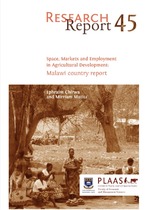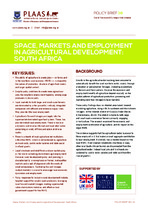Browsing Institute for Poverty, Land and Agrarian Studies (PLAAS) by Subject "Markets"
Now showing items 1-8 of 8
-
Community opportunities in aquaculture: what are the possibilities and limits?
(Institute for Poverty, Land and Agrarian Studies, University of the Western Cape, 2016)Aquaculture now contributes 47% of fish available for human consumption – up from 9% in 1980. This shift to aquaculture offsets the stagnation in the production from capture fisheries (FAO 2012). By 2030, demand for ... -
Space, markets and employment in agricultural development: Malawi
(Institute for Poverty, Land and Agrarian Studies, University of the Western Cape, 2015)Agriculture plays a significant role in Malawi’s national economy, contributing 35% to gross domestic product, 90% to foreign exchange earnings and providing employment to more than 80% of the labour force. Particularly ... -
Space, markets and employment in agricultural development: Malawi country report
(Institute for Poverty, Land and Agrarian Studies, University of the Western Cape, 2015)There is a growing literature on the links between farm and non-farm employment activities in rural societies and the important roles played by rural non-farm employment in poverty reduction (Lanjouw, 2001; Davis et al., ... -
Space, markets and employment in agricultural development: South Africa
(Institute for Poverty, Land and Agrarian Studies, University of the Western Cape, 2015)Growth in the agricultural sector has long been assumed to automatically benefit the rural non-farm sector, mainly through production or consumption ‘linkages’, including expenditure by farmers and their workers. However ... -
Space, markets and employment in agricultural development: South Africa country report
(Institute for Poverty, Land and Agrarian Studies, University of the Western Cape, 2015)Throughout much of the developing world, including sub-Saharan Africa, agriculture is frequently viewed as central to efforts to foster development and reduce poverty. Key conceptual and policy issues accordingly raised ... -
Space, markets and employment in agricultural development: Zimbabwe
(Institute for Poverty, Land and Agrarian Studies, University of the Western Cape, 2015)Growth in the agricultural sector has long been assumed to automatically benefit the rural non-farm sector, chiefly through various production or consumption expenditure ‘linkages’ including local expenditure by farmers ... -
Space, markets and employment in agricultural development: Zimbabwe country report
(Institute for Poverty, Land and Agrarian Studies, University of the Western Cape, 2015)Since independence in 1980, Zimbabwe has undergone several phases of land redistribution, generally to communal and working people. The latest phase was the Fast-Track Land Reform Programme (FTLRP), which began in 2000 ... -
Status report on land and agricultural policy in South Africa
(PLAAS, University of the Western Cape, 2010)A strategy that seeks to insert smallholders into the large-scale, industrial, export-oriented model can only succeed in broadening and diversifying the producer base slightly. The large-scale model also brings ...








